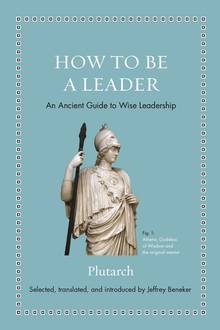How to Be a Leader: An Ancient Guide to Wise Leadership
Plutarch / Beneker, Jeffrey
Éditeur : PRINCETON UNIVERSITY PRESS
ISBN papier: 9780691192116
Parution : 2019
Code produit : 1391666
Catégorisation :
Livres /
Gestion /
Gestion des ressources humaines /
Leadership
Formats disponibles
| Format | Qté. disp. | Prix* | Commander |
|---|---|---|---|
| Livre papier | En rupture de stock** |
Prix membre : 15,26 $ Prix non-membre : 16,95 $ |
*Les prix sont en dollars canadien. Taxes et frais de livraison en sus.
**Ce produits est en rupture de stock mais sera expédié dès qu'ils sera disponible.
Description
Timeless advice on how to be a successful leader in any field The ancient biographer and essayist Plutarch thought deeply about the leadership qualities of the eminent Greeks and Romans he profiled in his famous--and massive--Lives, including politicians and generals such as Pericles, Alexander the Great, Julius Caesar, and Mark Antony. Luckily for us, Plutarch distilled what he learned about wise leadership in a handful of essays, which are filled with essential lessons for experienced and aspiring leaders in any field today. In How to Be a Leader, Jeffrey Beneker presents the most important of these essays in lively new translations accompanied by an enlightening introduction, informative notes, and the original Greek on facing pages. In "To an Uneducated Leader," "How to Be a Good Leader," and "Should an Old Man Engage in Politics?" Plutarch explains the characteristics of successful leaders, from being guided by reason and exercising self-control to being free from envy and the love of power, illustrating his points with memorable examples drawn from legendary Greco-Roman lives. He also explains how to train for leadership, persuade and deal with colleagues, manage one's career, and much more. Writing at the height of the Roman Empire, Plutarch suggested that people should pursue positions of leadership only if they are motivated by "judgment and reason"--not "rashly inspired by the vain pursuit of glory, a sense of rivalry, or a lack of other meaningful activities." His wise counsel remains as relevant as ever.























